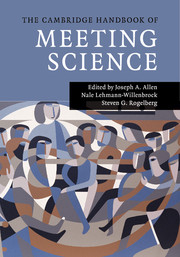Book contents
- The Cambridge Handbook of Meeting Science
- The Cambridge Handbook of Meeting Science
- Copyright page
- Dedication
- Contents
- Tables
- Figures
- Contributors
- Book part
- Part I Introduction
- Part II Premeeting Activities and Context
- Part III The Meeting Itself
- Part IV Special Types of Meetings
- Postevent Meetings
- Virtual Meetings
- 28 Meeting Organization Strategy
- 29 The Successful Facilitation of Virtual Team Meetings
- Part V Synthesis and Conclusion
- Book part
- Author Index
- Subject Index
- References
29 - The Successful Facilitation of Virtual Team Meetings
from Virtual Meetings
Published online by Cambridge University Press: 05 August 2015
- The Cambridge Handbook of Meeting Science
- The Cambridge Handbook of Meeting Science
- Copyright page
- Dedication
- Contents
- Tables
- Figures
- Contributors
- Book part
- Part I Introduction
- Part II Premeeting Activities and Context
- Part III The Meeting Itself
- Part IV Special Types of Meetings
- Postevent Meetings
- Virtual Meetings
- 28 Meeting Organization Strategy
- 29 The Successful Facilitation of Virtual Team Meetings
- Part V Synthesis and Conclusion
- Book part
- Author Index
- Subject Index
- References
Summary
Virtual teams, whose members may be engaged in interdependent tasks while geographically dispersed, are highly prevalent workgroups within organizations today. Because these global virtual teams must rely on technology to fulfill team goals across time and space, they may warrant unique meeting styles and structure. This chapter reviews the literature on virtual team meetings, providing evidence regarding the factors that may aid in the facilitation of such meetings based on existing research, and offers practitioners and professionals guidelines for successfully facilitating virtual team meetings. Drawing on previous meeting and global virtual team research, we make the following recommendations: select a facilitator, select appropriate information and communication technology, set meeting norms, set and reinforce team roles, acknowledge time zone and cultural differences, and follow up with action items.
- Type
- Chapter
- Information
- The Cambridge Handbook of Meeting Science , pp. 680 - 706Publisher: Cambridge University PressPrint publication year: 2015
References
- 17
- Cited by

